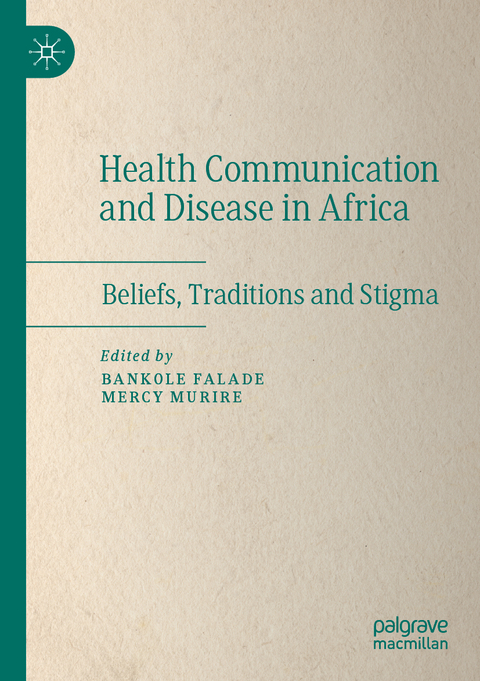
Health Communication and Disease in Africa
Palgrave Macmillan (Verlag)
978-981-16-2548-0 (ISBN)
This book is a collection of essays from across Africa which highlight the roles of beliefs and traditions in health behaviour. Chapters address mental health, risk perception, stigma, reproductive health, religion and health. The book also examines conceptual approaches in health communication and community development, both western and indigenous.
Specific topics include Alzheimer’s, HIV and stigma; perception of risk from obesity, HIV prevention and preeclampsia; doctor-patient relationship and health beliefs of birth attendants; culture and mental health access and social media effects on mental health; the complementary use of contemporary and indigenous communication strategies and the accommodation of science by religious leaders during the COVID 19 pandemic.
The book, which starts by examining global inequalities in health, proposes an African approach informed by problematisation as theorised by Foucault and Freire, to unpack habits and social problems. It ends by asking the question: “Is science enough” and making a strong case for health enabling environments alongside science communication.
Bankole Falade is a research fellow with the South African Research Chair in Science Communication, Stellenbosch University, South Africa and Visiting Fellow, Department of Psychological and Behavioural Sciences, London School of Economics and Political Science, United Kingdom. His research interests are in science and health communication. Mercy Murire is a Senior researcher at the Wits Reproductive Health Institute (WRHI) and a researcher at University of Witwatersrand with the school of clinical medicine. Her research interests are in psychology and public health focusing on the intersections between sexual and reproductive health (SRH), mental health, sexually transmitted infections (STIs), HIV prevention, HIV stigma, contraceptives, and gender-based violence in adolescent girls and young women.
Part 1: Introduction.- Chapter 1: Global inequalities in health and Africa.- Part 2: Conceptual approaches.- Chapter 2: Health beliefs and communication: conceptual approaches.- Chapter 3: Understanding Community Development Approaches in health.- Part 3: Stigma and health.- Chapter 4: Alzheimer’s disease – molecular defect, public perceptions and stigma in South Africa.- Chapter 5: Toward a better understanding of HIV Prevention stigma, religion and health in Zimbabwe.- Chapter 6: Sinikithemba Gospel Group and the Grassroots Struggle against HIV/AIDS Stigma in South Africa.- Part 4: Risk perception and health.- Chapter 7: “Fat people are more respected: Socio-cultural Construction of Obesity and overweight Risk & Prevention in Ugandan Communities.- Chapter 8: “… I had to do this to survive”: HIV risk environment of female street sex work in Nigeria.- Part 5: Reproductive health, traditions and beliefs.- Chapter 9: The sociolinguistic functions of English and Chichewa in GynaecologicalConsultations in a Chichewa speaking Hospital Setting in Malawi.- Chapter 10: Evil spirits and martyrdom as perceptions of preeclampsia among traditional birth attendants in Kano, North-West Nigeria.- Part 6: Mental health.- Chapter 11: Culture and Mental Healthcare Access in the Moroccan Context.- Chapter 12: Social media effects on mental Health: A study of ‘Selfitis’ among undergraduates of a Nigerian university.- Part 7: Communities, western and indigenous communication.- Chapter 13: Collective change through mass media: Engaging adolescent girls through interactive radio to promote AIDS-free communities in Kenya.- Chapter 14: Combating malaria in Nigeria’s rural communities through indigenous communication strategies.- Chapter 15: Indigenous and contemporary knowledge as interventions to reduce teenage pregnancy in South Africa.- Part 8: Religion and health communication.- Chapter 16: Covid-19, religious institutions and the accommodation of science in Africa.- Part 9: Conclusion.- Chapter 17: Is science enough? Health communication and health enabling environments.- Index.
| Erscheinungsdatum | 01.10.2022 |
|---|---|
| Zusatzinfo | 8 Illustrations, color; 2 Illustrations, black and white; XV, 401 p. 10 illus., 8 illus. in color. |
| Sprache | englisch |
| Maße | 148 x 210 mm |
| Themenwelt | Studium ► 1. Studienabschnitt (Vorklinik) ► Med. Psychologie / Soziologie |
| Sozialwissenschaften ► Kommunikation / Medien ► Medienwissenschaft | |
| Sozialwissenschaften ► Soziologie | |
| Schlagworte | Africa health beliefs • Communication Studies • Community Health • Health Communication • HIV/Aids • Indigenous knowledge • Public Understanding of Science • Sex Work • Social Psychology • social representations • Witchcraft |
| ISBN-10 | 981-16-2548-4 / 9811625484 |
| ISBN-13 | 978-981-16-2548-0 / 9789811625480 |
| Zustand | Neuware |
| Haben Sie eine Frage zum Produkt? |
aus dem Bereich


